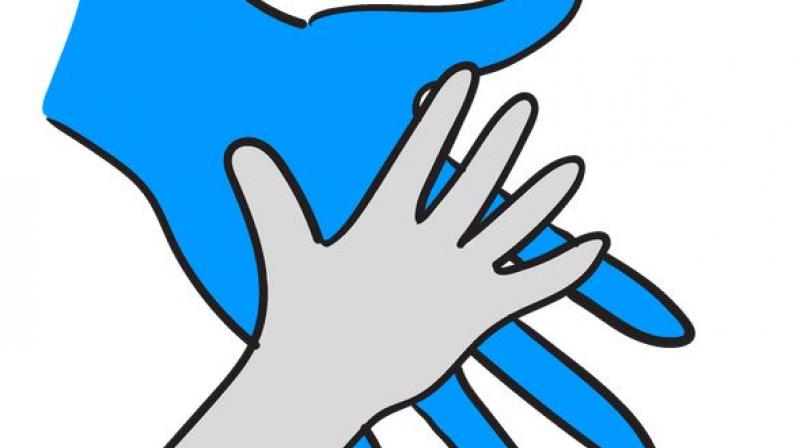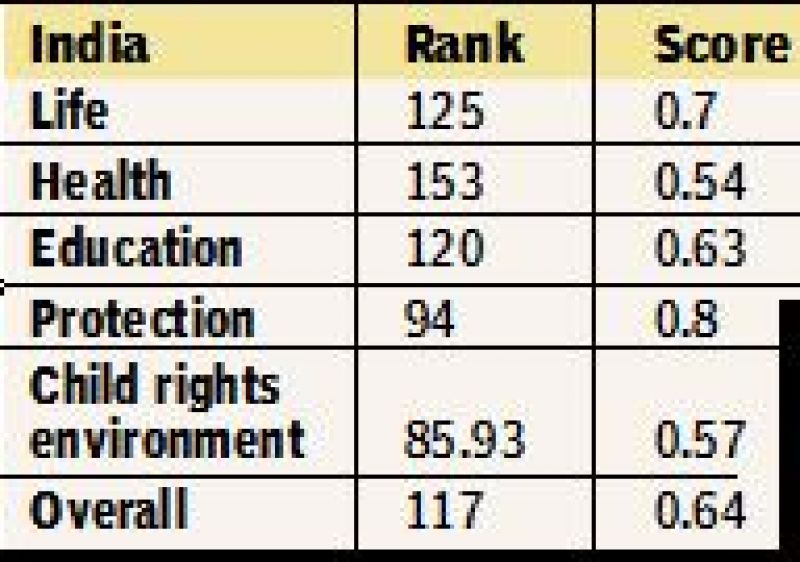India performs poorly in kids right index, ranks 117
Even the neighbouring countries of Bangladesh and Sri Lanka are investing better in education.

Hyderabad: India stands in a lowly 117th position out of 181 countries in the KidsRight Index, the annual global index which ranks how countries adhere to and are equipped to improve child rights. Countries are judged on five indicators: right to life, right to education, right to health, right to protection and enabling environment for child rights.
KidsRights Index is an initiative of Kids Right Foundation in cooperation with Erasmus University, Rotterdam. They release annual reports every year by pooling data from UNICEF, UNDP and UN Committee on the Rights of the Child by considering individual country reports.
India has a score of 0.64 out of 1 in the overall category. Out of all categories, it performed better in protection and child rights environment and secured 94th rank with a score of 0.8 in the protection category and performed worst in the health indicator being ranked 153 with a score of 0.54.
Around 45 per cent of children in our country are malnourished and India spends only 1.2 per cent of its GDP on health and 3.7 per cent on education, when the international standard on education is 6 per cent.
Several promises were made and none kept in bettering this record. Even the neighbouring countries of Bangladesh and Sri Lanka are investing better in education. Without addressing these important factors, how can our country become a global leader, asked Ambarish Rai, National Convenor, Right To Education Forum.
He added that the universalisation of education through Right To Education should be extended to primary and secondary schools as well for all age groups of children, instead of only for children from 6 to 14 years. “Child rights in our country are being violated even before the birth of the child. There are no ambulance services or road connectivity in rural areas and delivery has become a herculean task for women,” said child rights activist Achyuta Rao of the Balala Hakkula Sangam.
He said there should be a separate ministry for children and proper policies on child protection instead of considering it as an additional task in the Women and Child Development ministry.
 Iceland secured the top position
Iceland secured the top position
When it comes to the child rights environment, India has scored 0.57 and ranks 85.93. This indicator considers legislation, budget, non-discrimination and participation of children.
Educationist Amarnath Vasireddy says that in our country “we don’t appreciate the concept of child rights because of patriarchy and paternal despotism, and think whatever we do is for the ‘welfare’ of children. Even after corporal punishment has been banned officially, it is being practised in 50 to 60 per cent of both government and private schools.”
He added that even after all these years of implementing the Right to Education, a large chunk of children in rural areas and children from migrant families whose parents work on constructions sites are being deprived of formal education for various reasons and are on the drop out list. Children are being deprived of nutritious food, and are being fed an imbalanced diet and are falling prey to junk food, experts say.
According to the KidsRights Index, some economically developed countries such as the UK and New Zealand have also scored poorly on the basic principles of the Convention on the Rights of the Child (CRC). These principles include: non-discrimination, acting in the child’s best interests, child participation and having a basic policy infrastructure for children’s rights.
Iceland secured the top position in the index with a score of 0.967, followed by Portugal with a score of 94.8.

